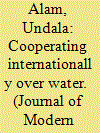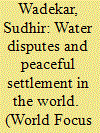|
|
|
Sort Order |
|
|
|
Items / Page
|
|
|
|
|
|
|
| Srl | Item |
| 1 |
ID:
110816


|
|
|
|
|
| Publication |
2012.
|
| Summary/Abstract |
We engage in a critical assessment of the neo-malthusian claim that climatic changes can be an important source of international tensions, in the extreme even militarized interstate disputes. The most likely scenario is conflict over water allocation in international catchments shared by poorer, less democratic, and politically less stable countries, governed by weak international water management institutions, and exposed to severe climatic changes. The Syr Darya corresponds quite well to all these characteristics. If the neo-malthusian specter of conflict over water is empirically relevant, we should see signs of this in the Syr Darya. The riparian countries of the Aral Sea basin have experienced international disputes over water allocation ever since the USSR collapsed and, with it, existing water management institutions and funding. The worst such dispute concerns the Syr Darya, one of the two largest rivers in Central Asia. Based on hydrological data and other information we find that the only existing international water management institution in the Syr Darya has failed. Based on a coupled climate, land-ice and rainfall-runoff model for the Syr Darya, we then examine whether, in the absence of an effective international water allocation mechanism, climate change is likely to make existing international tensions over water allocation worse. We find that climate change-induced shifts in river runoff, to which the Uzbek part of the Syr Darya catchment is particularly vulnerable, and which could contribute to a deterioration of already strained Kyrgyz-Uzbek relations, are likely to set in only in the medium to long term. This leaves some time for the riparian countries to set up an effective international framework for water allocation and prevention of climate-induced geohazards. By implication, our findings suggest that a climate change-induced militarized interstate dispute over water resources in Central Asia is unlikely.
|
|
|
|
|
|
|
|
|
|
|
|
|
|
|
|
| 2 |
ID:
113175


|
|
|
|
|
| Publication |
2012.
|
| Summary/Abstract |
Since the early 1960s, Guinea, Mali, Mauritania and Senegal have cooperated over the Senegal river. Contrary to the norms of managing international rivers, the riparians have subjugated their sovereignty and incurred national debt to jointly develop the benefits from their shared river, despite intra-basin tensions and conflict. The Senegal experience highlights an alternative path to tackling the consequences of climate change, poor water management and increasing demand. In seeking to explain the intensity of international cooperation displayed in the basin, this article examines the characteristics of international rivers and the Senegal basin's history, and concludes that Pan-Africanism, francophonie and the political leaders' attitudes to regional cooperation shaped l'espace OMVS.
|
|
|
|
|
|
|
|
|
|
|
|
|
|
|
|
| 3 |
ID:
106935


|
|
|
|
|
| Publication |
2011.
|
| Summary/Abstract |
Water scarcity is popularly associated with inter-state conflict, yet the academic literature also touts scarcity as an important variable for understanding cooperation over international freshwater. Building on studies that consider the relationship between scarcity and hydro-political cooperation, this paper empirically investigates why water treaties are negotiated for some rivers and between some riparians, and not others. Rather than considering a linear relationship between scarcity and cooperation, this study hypothesizes a curvilinear relationship expecting agreements to emerge in situations where scarcity is moderate rather than very low or high. Additional variables considered for understanding treaty formation include level of governance among the riparian states, prevailing power dynamics along the river, overall inter-riparian relations (measured by trade, diplomatic ties, and militarized disputes), and the geographical configuration of the entire river. The hypothesized curvilinear relationship between water scarcity and cooperation finds significant support in the empirical analyses. Governance, diplomatic relations, and trade are likewise found to be salient in explaining the levels of cooperation. The geographical configuration of the river was significant in only part of the estimates, and the militarized disputes variable was found to be insignificant across all models. Finally, while results confirm that cooperation may not depend on power asymmetries within riparian dyads, as suggested by some theories, the paper does find support for the contention that more developed states are in a position to provide incentives, such as financial transfers, to less-developed states so as to facilitate an international agreement.
|
|
|
|
|
|
|
|
|
|
|
|
|
|
|
|
| 4 |
ID:
145370


|
|
|
|
|
| Summary/Abstract |
Water is useful in various uses. Today its availability is core issue. World is struggling to cope with water scarcity. Water security has vital place in the governments’ agenda. Global climatic change will affect water availability. It is predicted that by the year 2025 a full 35 per cent of the world population will be living under conditions of water scarcity or stress. Formerly internal rivers have now become international water. Since the Second World War, the total number of the world’s independent nations has doubled. Decolonization is the reason in the increase of number of International River. Non-navigational uses of waters get importance thannavigational uses.
|
|
|
|
|
|
|
|
|
|
|
|
|
|
|
|
|
|
|
|
|